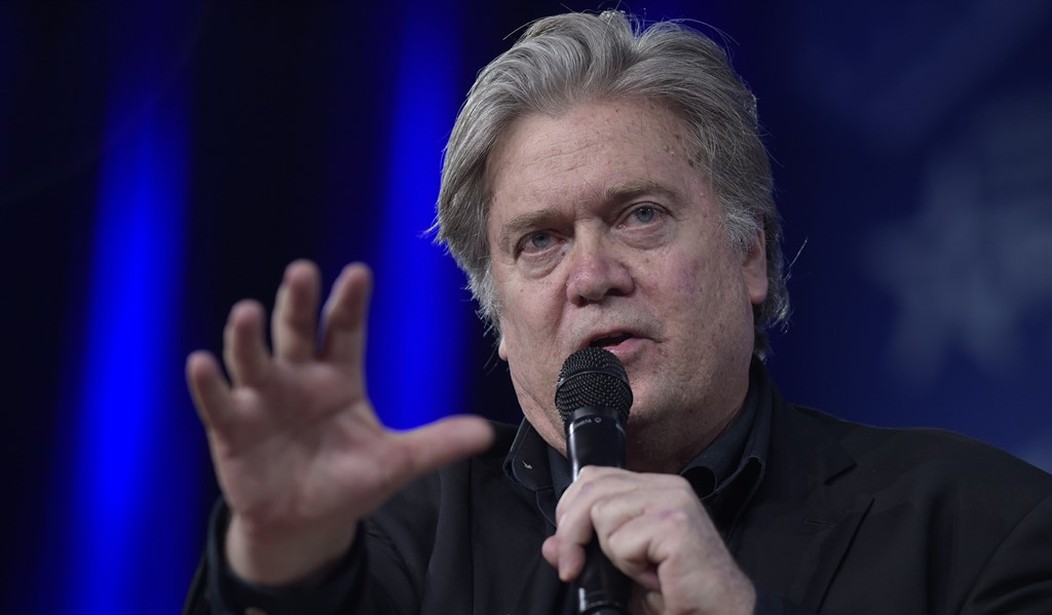Jazz and Ed have written about the substance of it but I’m more interested in motive. Why is Steve Bannon dialing up a progressive magazine, of all things, and chattering to them about the alt-right and North Korea? Jazz’s point earlier about Bannon undermining NorK strategy is right on target: It’s bizarre for a White House political advisor to be out there in the middle of a standoff where the U.S. is saber-rattling and proclaiming that, er, there is no military option. If you want to intimidate Kim Jong Un into getting rid of his nukes, having the president’s right-hand man declare that an attack is off the table is … unhelpful.
The spin last night while politicos were oohing and ahhing over the interview was that Bannon didn’t realize it was on the record.
The White House chief strategist has told associates he never intended to do an “interview” with an editor at the American Prospect, a left-wing publication.
Bannon has told associates that he admired the author’s stance on China, and so called the journalist, Robert Kuttner, on Tuesday, to discuss his piece. Apparently Bannon never thought that the journalist might take his (very newsworthy) comments and turn them into a story. It’s Anthony Scaramucci all over again (minus the curse words.)…
Here’s what one of Bannon’s colleagues — somebody who’s not an enemy of his — told me after reading the piece: “Since Steve apparently enjoys casually undermining U.S. national security, I’ll put this in terms he’ll understand: This is DEFCON 1-level bad.”
Please. There’s no way a media junkie as savvy as Bannon would assume a reporter would protect the confidentiality of a juicy conversation, especially when that reporter is an ideological enemy like Kuttner. Said Brandon Darby of Breitbart, “I know him too well when it comes to how he handles journalists. He wouldn’t think something was off record even if reporter said it was.” I don’t buy this morning’s spin either, that Bannon was throwing out a little “stray voltage” on Trump’s behalf to turn people’s attention away from the Charlottesville clusterfark. He could have done that without broaching the subject of North Korea. And as Ed noted earlier, it makes no sense given Trump’s decision to revisit the underlying issue in Charlottesville yet again this morning by tweeting about Confederate monuments.
I’ll give you two cynical possibilities. My hot-take speculation of the last few days has been that Bannon is resigned to leaving the White House soon, having concluded that Trump’s first term can only end in failure now, but wants to be make sure he’s fired rather than pressured into quitting somehow. Being fired after all the headlines about his war with H.R. McMaster and the “globalists” in the West Wing would make him a martyr to the nationalist cause, which will be great for his stature when he returns to populist media. Resigning makes him a quitter, albeit a sympathetic one to his constituents. Being fired makes him a sacrifice, betrayed by the president whom America’s right-wing populists elected. If he’s booted, Bannon might end up surpassing Trump as the most popular political figure in America among populist activists (assuming he hasn’t already). Under this theory, the North Korea stuff is really just a parting kick in the nuts to McMaster, portraying him implicitly as a liar who’s telling Americans that the military will protect them from NorK nukes when it really can’t. There’s a flaw in the theory, though: If Bannon’s anticipating becoming the champion of American populists, why’d he bash “ethno-nationalism” in the Kuttner interview? Not all populists are alt-righters, of course, but they’re part of the broader right. By talking about “crushing” them, Bannon’s setting up a conflict within right-wing populism rather than trying to unify it behind him by smoothing over its differences.
The other theory is that he very much doesn’t want to be fired and did the Kuttner interview as a shot across Trump’s bow, warning him that he can make plenty of trouble for the White House if he’s removed. On this reading, exposing Trump’s North Korea rhetoric as a bluff is a bet-the-house gamble by Bannon: He’s showing the president that he’s willing and able to publicly undermine his tough talk about foreign policy and trade to Trump’s populist base if Trump makes an enemy of him by canning him. Meanwhile, if Trump doesn’t can him for calling BS on the administration’s North Korea position, Bannon will appear bulletproof to all of his rivals inside the White House. He’ll have gotten away with embarrassing the president and his national-security team and survived, which will operate almost as a formal announcement that Trump can’t fire him for fear of alienating his own base — especially the Mercer family that supports Bannon.
The two theories aren’t strictly contradictory. Bannon may be unhappy enough with the environment inside the West Wing and the trajectory of Trump’s presidency right now that he decided to make a power play to try to change it. If Trump lets him slide on the Kuttner interview, it serves notice to Kelly and McMaster that Bannon doesn’t answer to them like other Trump advisors do. If Trump ends up firing him, no biggie: Bannon rides off into the sunset as a populist hero who refused to compromise and was ousted in a “globalist” coup. Either he’ll regain some stature in the White House or he’ll be martyred and build further stature among the nationalist right.







Join the conversation as a VIP Member